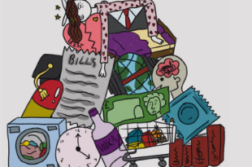Content Warning: Mental health issues
For many people, the idea of slipping mental health and the slope that is depression tends to look a lot like someone ceasing to be able to function, be productive and find their way through the darkness and procrastination. It is that kind of rock bottom, curled up in your bed, too sad or isolated to do anything, image. And that is by all accounts often quite common for people with mental health problems, but there is another end to the spectrum.
Productivity and often extreme productivity have been pushed online, particularly in online study communities, as huge solutions for issues like depression and anxiety. It is a way to always be creating instead of consuming, to keep your mind occupied with tasks and lists and goals, so you cannot wallow or fixate on anything else that may be happening in your head. Productivity as a mental health solution is seen as superior, in my opinion, to the kind of manifestation of mental health issues I described earlier.
And so, like many people, when I found my head clouded, and spinning, and my mind running through all the things that were overwhelming and scaring me, I decided to go the other way to the way I’d gone before. My diary started to grow, social occasions, meetings and projects began to take hold and I started to ‘cope’. Being busy, tired and mentally occupied often feels and looks a lot like coping, particularly if you have gone from one extreme to the next. I would argue that many people look at this kind of ‘coping’ or manifestation of mental illness as much more socially acceptable than the other kind. So many people handle their mental health problems by filling their time, and a lot of the time that does help to provide consistency and routine, but it can also morph into the fear and desperation that comes with feeling like any time not spent being immediately productive means you are wasting your time.
This overwhelming worry that you are wasting your time, and awareness of your own mortality, can cause a whole host of mental repercussions. I sometimes find myself physically and mentally exhausted but still beating myself up for sleeping in one extra hour. Or I’ll be pushing myself to socialise and then feeling awful for not sitting and doing work when with my friends. This leads to a lot of exhaustion, stress and often very obsessive behaviours. I struggle to understand other people’s time management and obsessively create a routine or script for my life. I am getting better with this, and learning to breathe, but I still, once I finish one project, must find another to take on, and I don’t see that stopping anytime soon.
As much as we must check in on our friends who are self-isolating and wallowing, we must remember that sometimes there are people who seem high-functioning, or highly productive, but for whom this is symptomatic of the same mental health issues. It’s great for your CV, sure, but has similar detrimental effects on your mental health to behaviours at the direct antithesis of it, and being highly caffeinated and productive is often the winding road to a mid-afternoon panic attack.



